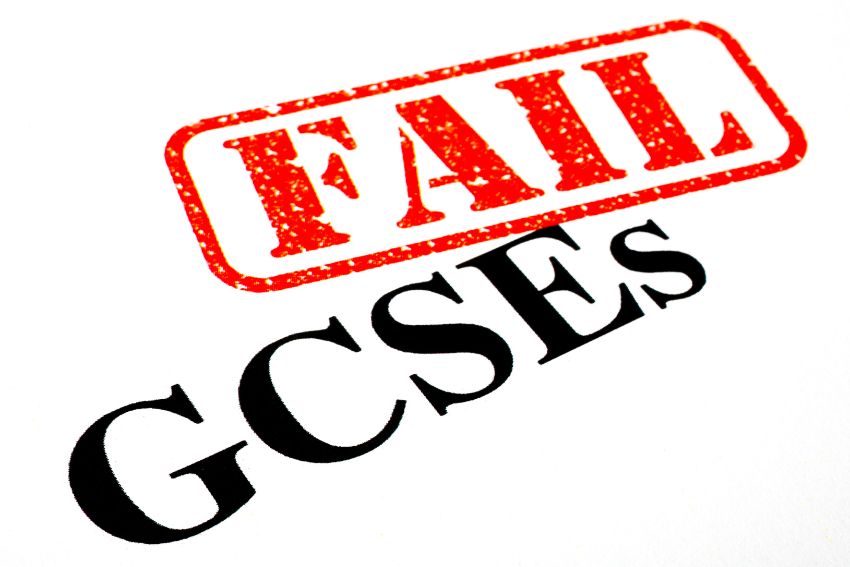Failing GCSE Maths can feel overwhelming, especially with the subject’s importance for further education and many career paths. For students and parents alike, understanding the implications of not passing, as well as the opportunities available to turn things around, can bring reassurance and direction.
In this guide, we’ll explore what happens if you fail your Maths GCSE, from mandatory resit requirements and alternative qualifications to tips for preparing for another try. By the end, you’ll see that while a setback in Maths can be challenging, it’s also an opportunity to grow, learn, and plan your next steps confidently. For parents whose children are showing early warning signs in their mock exams, our guide on what to do if your child fails their GCSE mocks provides proactive strategies.

Immediate Consequences of Failing Maths GCSE
Firstly, lets figure out what outcome did we get from failing the test.
Impact on Further Education
One of the primary challenges of failing Maths GCSE is the limitation it places on entry into many post-16 options. Many colleges, sixth forms, and apprenticeship programmes require at least a grade 4 in GCSE Maths to qualify for A-level courses or vocational studies. Without this pass, students may find their subject choices restricted, as even unrelated fields often expect a basic level of numeracy.
A pass in Maths GCSE is essential for university, as many institutions require it for entry. Without it, even strong A-levels may not secure access to certain programmes, especially in business, science, technology, engineering, and healthcare.
To help students meet these requirements, colleges usually offer Maths resit options, sometimes making them a condition of entry. Resitting in this supportive environment allows students to continue with other studies while working towards that essential Maths pass.
Employment Prospects
Beyond education, many employers view GCSE Maths as a benchmark for essential skills in problem-solving, reasoning, and basic numeracy. Whether applying for an entry-level job or aiming for an apprenticeship, a pass in Maths GCSE is often a requirement. Roles in administration, retail, and even trades often ask for this qualification, as it demonstrates a foundational level of competency in numbers and logical thinking.
For those interested in apprenticeships, especially in skilled trades or technical roles, a GCSE pass in Maths is nearly always required. Employers value the problem-solving skills that Maths fosters, and without this qualification, prospective apprentices may face more limited opportunities. In situations where GCSE Maths has not been passed, alternative routes, like Functional Skills Maths Level 2, can sometimes be accepted, though this depends on the employer and sector.
Overall, while failing GCSE Maths does create challenges, the path to further education and career development remains open with determination, resit options, and additional support.
Can You Still Go to College if You Fail Your GCSEs?
Yes, you can still go to college if you fail your GCSEs. However, options may be more limited, with extra requirements in place. Colleges understand that not everyone achieves the needed grades on their first try. Many offer support and pathways to help students continue their education and reach their goals.
Foundation Courses and Alternative Pathways
Many colleges offer foundation courses or Level 1 programmes for students who didn’t meet standard entry requirements. These courses help students gain skills and qualifications in a supportive setting, with the chance to progress to more advanced studies if they improve. In some cases, students can move to Level 2 or Level 3 courses (like A-levels or vocational diplomas) after completing a foundation year, provided they meet required standards.
Resit Programmes for Maths and English
Many post-16 study programmes require students to keep working toward passing GCSE Maths and English if they haven’t scored at least a grade 4. Colleges often provide resit courses, letting students study these subjects alongside other courses. These programmes usually include targeted support and tutoring to boost their chances of passing.
Vocational Courses and Apprenticeships
For students who prefer hands-on learning, vocational courses and apprenticeships are excellent options. Some vocational programmes are flexible with entry requirements. They may not require a full set of GCSEs, although Maths and English resits are still typically needed. Fields like construction, hospitality, and creative industries often offer entry-level options. These focus on developing practical skills and industry knowledge, giving students a way forward even without passing all their GCSEs.
Entry Requirements and Individual College Policies
Entry requirements can vary between colleges, with some being more flexible than others. Many colleges assess students on a case-by-case basis, taking into account their interests, strengths, and any potential to succeed with support. Speaking with college admissions teams can be helpful in understanding what options are available and how to meet the necessary requirements for specific courses.
In short, failing GCSEs doesn’t necessarily close the door to college, but it may shift the options available. With the right support and a plan in place, students can still find rewarding educational pathways and work towards their future goals.

What Options Do I Have Now?
Failing GCSEs can feel disheartening, but it’s essential to know that multiple options are available to help you move forward. Whether you want to retake exams, explore alternative qualifications, or dive into a more hands-on approach with vocational training, there’s a path suited to your strengths and goals. Here’s a look at some of the most popular options:
1. Retaking GCSE Exams
If you’re determined to pass your GCSEs, particularly in core subjects like Maths and English, many schools and colleges offer resit opportunities. These retakes are typically scheduled for the following academic year or sometimes in November, giving you time to study and seek additional support if needed. Many institutions even offer specialised resit courses that focus on boosting understanding and exam technique to help improve your results.
2. Exploring Functional Skills Qualifications
For students who may find GCSEs challenging, Functional Skills qualifications in Maths and English are widely recognised alternatives. These courses focus on practical applications of numeracy and literacy, helping students develop skills that are essential for everyday life and many career paths. In many cases, Functional Skills Level 2 is considered equivalent to a GCSE pass and can open doors to jobs, apprenticeships, and further education.
3. Starting a Vocational Course or Apprenticeship
Vocational courses and apprenticeships offer hands-on experience outside traditional academics. Many industries, like construction, healthcare, hospitality, and IT, have entry-level training programmes. These often don’t require a full set of GCSEs, although Maths and English study may still be needed. Vocational courses help you build practical skills and earn recognised qualifications, often in real-world settings.
4. Studying for a BTEC or Other Practical Qualification
BTEC qualifications offer an alternative to GCSEs. They focus on building skills and applying knowledge in areas like business, engineering, art, and health and social care. Employers and universities highly value BTECs. Level 2 and Level 3 courses allow progression to further education or directly into the workforce. This route suits students who perform better with continuous assessment rather than exams.
5. Exploring Adult Education Courses
If you’ve left school and still want to gain GCSE-level qualifications, many adult education centres and online platforms offer courses designed for adult learners. These courses are often more flexible, allowing you to learn at your own pace, which can be helpful if you’re balancing other commitments. Adult education courses can lead to GCSE-equivalent qualifications and may even offer support with Maths and English skills.
6. Starting Work and Developing Skills on the Job
For some students, joining the workforce is the most motivating option. Many entry-level jobs don’t require GCSEs. Roles in retail, customer service, and hospitality often offer on-the-job training. Building work experience can develop essential skills like teamwork, communication, and problem-solving. This experience creates a strong foundation for future opportunities, including career growth and further training.
7. Seeking Support from Careers Advisors
Speaking to a careers advisor can help you explore your options. They can guide you based on your interests, strengths, and future goals. Advisors also offer insights into lesser-known pathways and help you recognise your personal strengths. They can connect you with resources for additional learning and support.
While failing GCSEs is challenging, it doesn’t mean the end. There are many ways forward, including resits, alternative qualifications, practical training, and work experience. With a clear plan and a positive mindset, you can make the most of these opportunities and continue pursuing your goals.
Resitting Exams

Failing a GCSE exam, particularly in core subjects like Maths or English, may feel discouraging, but resitting offers a valuable second chance to succeed. Here’s what you need to know about resitting exams and how to make the most of this opportunity.
Why Resit Exams?
Many students choose to resit exams to meet the minimum grade requirements for further education, apprenticeships, or certain job roles. For example, achieving at least a grade 4 in Maths and English is often required to move forward in college courses or career pathways. Resitting allows you to build on what you’ve already learned, address any knowledge gaps, and work towards a passing grade.
When Can You Resit?
Resits for GCSEs are typically offered twice a year. Most students can retake exams in November for core subjects like Maths and English or wait until the summer exam season, giving more time for preparation. Schools and colleges often provide these resit opportunities, helping students to balance their studies with revision.
Preparing for a Resit
Taking the time to prepare effectively is key to improving your results. Here are some tips:
- Identify Weak Areas: Review past papers and feedback to pinpoint the areas that need the most improvement.
- Create a Study Plan: Plan revision sessions in manageable chunks to cover all necessary topics and build confidence gradually.
- Utilise Resources: Consider resources like online tutorials, study guides, and tutoring sessions tailored to GCSE resits.
- Practice with Past Papers: Familiarising yourself with exam formats and time management can make a big difference on the day.
Support Available for Resits
Many schools and colleges offer structured resit courses to help students succeed. These programmes often include extra classes, access to resources, and targeted support from teachers. For additional help, online tutoring platforms or private tutors can provide personalised guidance and strategies for tackling challenging topics.








